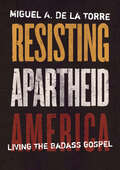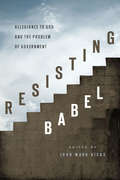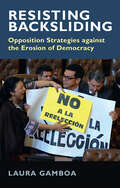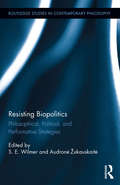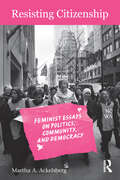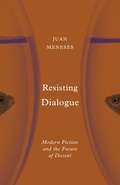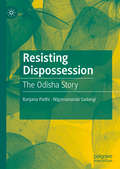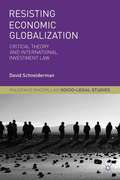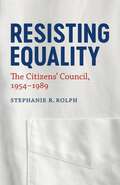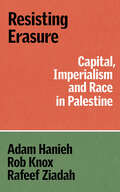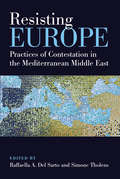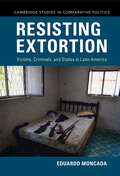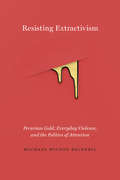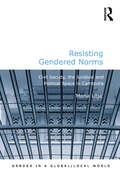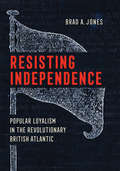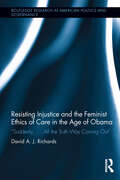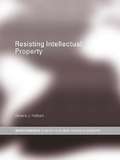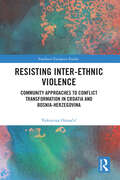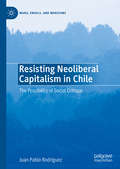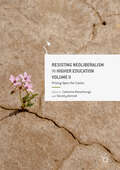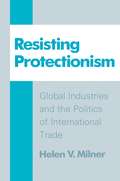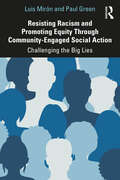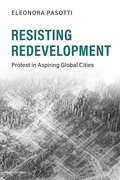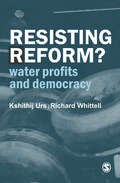- Table View
- List View
Resisting Apartheid America: Living the Badass Gospel
by Miguel A. De La TorreMiguel De La Torre foresees a future America dominated by white nationalists—and equips us with the tools to resist it. In Burying White Privilege, he opened our eyes to white Christians&’ complicity in maintaining racist hierarchy in America. In its sequel, Decolonizing Christianity, he encouraged us to decolonize Christianity and return it to its revolutionary roots. Now, in his conclusion to the trilogy, Miguel A. De La Torre shows us the America on our horizon, should we continue down the path of heretical white Christianity—and the outlook is not bright. Resisting Apartheid America assesses the past and present threads of systemic racism in American politics, from Plymouth Rock to the Capitol on January 6. Sweeping and unsparing in his critique, De La Torre takes on authors revered in Christian theology, including Paul, Augustine, and heroes of the Reformation, aiming to uproot the ideological foundations of racism in Christianity. Following these through lines of oppression, he warns of a decline in democracy and rise in political violence—but equips us with the nonviolent ethical framework to resist this bleak future. Resisting Apartheid America is a clarion call to Christians to remake America in the image of the God of liberation.
Resisting Babel: Allegiance to God and the Problem of Government
by John Mark HicksIf the kingdom of God demands exclusive allegiance, how do followers of Jesus engage with a world shaped by political power?After the trauma of the Civil War, David Lipscomb, a Nashville farmer and church leader, advocated for allegiance solely in the kingdom of God rather than in human governments. Resisting Babel tells the story of Lipscomb’s compelling, coherent, and eschatologically grounded vision, which fostered deep and significant religious reform in the United States and led to missionary zeal across the globe. That vision articulated a way forward for Christianity amidst the world powers, though it was later subverted by those powers, both by its own implicit assumptions from within and the overwhelming forces of Babel without. What happened among Churches of Christ during that time serves as a case study and parable of both possibility and warning for the modern church.In this new book, Hicks has assembled the leading voices on David Lipscomb. Contributors include:• Richard T. Hughes, Scholar in Residence at Lipscomb University, is the leading historian of Churches of Christ and has authored the standard work on its history.• Richard Goode, professor of history at Lipscomb University, has written about and practiced Pilgrim political theology, which is indebted in part to David Lipscomb.• Lee C. Camp, professor of theology at Lipscomb University, is a leading ethicist among Churches of Christ.• Joshua Ward Jeffery, AP History teacher at the Orme School in Mayer, AZ, is a leading historian of the relationship between pacifism, the church, and World War I.
Resisting Backsliding: Opposition Strategies against the Erosion of Democracy
by Laura GamboaIn the past two decades, democratically elected executives across the world have used their popularity to push for legislation that, over time, destroys systems of checks and balances, hinders free and fair elections, and undermines political rights and civil liberties. Using and abusing institutions and institutional reform, some executives have transformed their countries' democracies into competitive authoritarian regimes. Others, however, have failed to erode democracy. What explains these different outcomes? Resisting Backsliding answers this question. With a focus on the cases of Hugo Chávez in Venezuela and Alvaro Uribe in Colombia, the book shows that the strategies and goals of the opposition are key to understanding why some executives successfully erode democracy and others do not. By highlighting the role of the opposition, this book emphasizes the importance of agency for understanding democratic backsliding and shows that even weak oppositions can defeat strong potential autocrats.
Resisting Biopolitics: Philosophical, Political, and Performative Strategies (Routledge Studies in Contemporary Philosophy)
by S. E. Wilmer Audronė ŽukauskaitėThe topic of biopolitics is a timely one, and it has become increasingly important for scholars to reconsider how life is objectified, mobilized, and otherwise bound up in politics. This cutting-edge volume discusses the philosophical, social, and political notions of biopolitics, as well as the ways in which biopower affects all aspects of our lives, including the relationships between the human and nonhuman, the concept of political subjectivity, and the connection between art, science, philosophy, and politics. In addition to tracing the evolving philosophical discourse around biopolitics, this collection researches and explores certain modes of resistance against biopolitical control. Written by leading experts in the field, the book’s chapters investigate resistance across a wide range of areas: politics and biophilosophy, technology and vitalism, creativity and bioethics, and performance. Resisting Biopolitics is an important intervention in contemporary biopolitical theory, looking towards the future of this interdisciplinary field.
Resisting Brazil's Military Regime: An Account of the Battles of Sobral Pinto
by John W. F. DullesPraised by his many admirers as a "courageous and fearless" defender of human rights, Heráclito Fontoura Sobral Pinto (1893-1991) was the most consistently forceful opponent of the regime of Brazilian dictator Getúlio Vargas. John W. F. Dulles chronicled Sobral's battles with the Vargas government in Sobral Pinto, "The Conscience of Brazil": Leading the Attack against Vargas (1930-1945), which History: Reviews of New Books called "a must-read for anyone wanting to understand twentieth-century Brazil. " In this second and final volume of his biography of Sobral Pinto, Professor Dulles completes the story of the fiery crusader's fight for democracy, morality, and justice, particularly for the downtrodden. Drawing on Sobral's vast correspondence, Dulles offers an extensive account of Sobral's opposition to the military regime that ruled Brazil from 1964 to 1985. He describes how Sobral Pinto defended those who had been politically influential before April, 1964, as well as other victims of the regime, including Communists, once-powerful labor leaders, priests, militant journalists, and students. Because Sobral Pinto participated in so many of the struggles against the military regime, his experiences provide vivid new insights into this important period in recent Brazilian history. They also shed light on developments in the Catholic Church (Sobral, a devout Catholic, vigorously opposed liberation theology), as well as on Sobral's key role in preserving Brazil's commission for defending human rights.
Resisting Citizenship: Feminist Essays on Politics, Community, and Democracy
by Martha A. AckelsbergPolitical participation in America—supposedly the world’s strongest democracy—is startlingly low, and many of the civil rights and economic equity initiatives that were instituted in the 1960s and '70s have been abandoned, as significant proportions of the populace seem to believe that the civil rights battle has been won. However, rates of collective engagement, like community activism, are surprisingly high. In Resisting Citizenship, renowned feminist political scientist Martha Ackelsberg argues that community activism may hold important clues to reviving democracy in this time of growing bureaucratization and inequality. This book brings together many of Ackelsberg’s writings over the past 25 years, combining her own field work and interviews with cutting edge research and theory on democracy and activism. She explores these efforts in order to draw lessons—and attempt to incorporate knowledge—about current notions of democracy from those who engage in "non-traditional" participation, those who have, in many respects, been relegated to the margins of political life in the United States.
Resisting Dialogue: Modern Fiction and the Future of Dissent
by Juan MenesesA bold new critique of dialogue as a method of eliminating dissent Is dialogue always the productive political and communicative tool it is widely conceived to be? Resisting Dialogue reassesses our assumptions about dialogue and, in so doing, about what a politically healthy society should look like. Juan Meneses argues that, far from an unalloyed good, dialogue often serves as a subtle tool of domination, perpetuating the underlying inequalities it is intended to address.Meneses investigates how &“illusory dialogue&” (a particular dialogic encounter designed to secure consensus) is employed as an instrument that forestalls—instead of fostering—articulations of dissent that lead to political change. He does so through close readings of novels from the English-speaking world written in the past hundred years—from E. M. Forster&’s A Passage to India and Jeanette Winterson&’s The Passion to Indra Sinha&’s Animal&’s People and more. Resisting Dialogue demonstrates how these novels are rhetorical exercises with real political clout capable of restoring the radical potential of dialogue in today&’s globalized world. Expanding the boundaries of postpolitical theory, Meneses reveals how these works offer ways to practice disagreement against this regulatory use of dialogue and expose the pitfalls of certain other dialogic interventions in relation to some of the most prominent questions of modern history: cosmopolitanism at the end of empire, the dangers of rewriting the historical record, the affective dimension of neoliberalism, the racial and nationalist underpinnings of the &“war on terror,&” and the visibility of environmental violence in the Anthropocene. Ultimately, Resisting Dialogue is a complex, provocative critique that, melding political and literary theory, reveals how fiction can help confront the deployment of dialogue to preempt the emergence of dissent and, thus, revitalize the practice of emancipatory politics.
Resisting Dispossession: The Odisha Story
by Ranjana Padhi Nigamananda SadangiThe book brings to the reader a set of political and social narratives woven around people’s resistance against big dams, mining and industrial projects, in short, displacement and dispossession in Odisha, India. This saga of dispossession abounds with stories and narratives of ordinary peasants, forest dwellers, fisher folk and landless wage laborers, which make the canvas of resistance history more complete. The book foregrounds these protagonists and the events that marked their lives; they live in the coastal plains as well as the hilly and forested areas of south and south-west Odisha.The authors have chronicled the development trajectory from the construction of the Hirakud Dam in the 1950s to the entry of corporations like POSCO and Vedanta in contemporary times. It thus covers extensive ground in interrogating the nature of industrialization being ushered into the state from post-independent India till today. The book depicts how and why people resist the development juggernaut in a state marked with endemic poverty. In unraveling this complex reality, the book conveys the world view of a vast section of people whose lives and livelihoods are tied up to land, forests, mountains, seas, rivers, lakes, ponds, trees, vines and bushes. These narratives fill a yawning gap in resistance literature in the context of Odisha. In doing so, they resonate with the current predicament of people in other mineral-rich states in Eastern India. The book is an endeavour to bring Odisha on the map of resistance politics and social movements in India and across the world.
Resisting Economic Globalization: Critical Theory and International Investment Law (Palgrave Socio-Legal Studies)
by David SchneidermanResisting Economic Globalization explores the magnitude of the legal constraints imposed by these rules and institutions associated with the worldwide spread of neoliberalism. Much contemporary theorizing has given up on national states as a locus for countering the harmful effects of economic globalization. Though states provide critical supports to the construction and ongoing maintenance of transnational legal constraints, David Schneiderman argues that states remain crucial sites for resisting, even rolling back, investment law disciplines. Structured as a series of encounters with selected critical theorists, the book contrasts theoretical diagnoses with recent episodes of resistance impeding investment law edicts. This novel approach tests contemporary hypotheses offered by leading political and legal theorists about the nature of power and the role of states and social movements in facilitating and undoing neoliberalism's legal edifices. As a consequence, the foundations of transnational legality become more apparent and the mechanisms for change more transparent.
Resisting Equality: The Citizens' Council, 1954-1989 (Making the Modern South)
by Stephanie R. RolphIn Resisting Equality Stephanie R. Rolph examines the history of the Citizens’ Council, an organization committed to coordinating opposition to desegregation and black voting rights. In the first comprehensive study of this racist group, Rolph follows the Citizens’ Council from its establishment in the Mississippi Delta, through its expansion into other areas of the country and its success in incorporating elements of its agenda into national politics, to its formal dissolution in 1989.Founded in 1954, two months after the Brown v. Board of Education decision by the U.S. Supreme Court, the Council spread rapidly in its home state of Mississippi. Initially, the organization relied on local chapters to monitor signs of black activism and take action to suppress that activism through economic and sometimes violent means. As the decade came to a close, however, the Council’s influence expanded into Mississippi’s political institutions, silencing white moderates and facilitating a wave of terror that severely obstructed black Mississippians’ participation in the civil rights movement. As the Citizens’ Council reached the peak of its power in Mississippi, its ambitions extended beyond the South. Alliances with like-minded organizations across the country supplemented waning influence at home, and the Council movement found itself in league with the earliest sparks of conservative ascension, cultivating consistent messages of grievance against minority groups and urging the necessity of white unity. Much more than a local arm of white terror, the Council’s work intersected with anticommunism, conservative ideology, grassroots activism, and Radical Right organizations that facilitated its journey from the margins into mainstream politics.Perhaps most crucially, Rolph examines the extent to which the organization survived the successes of the civil rights movement and found continued relevance even after the Council’s campaign to preserve state-sanctioned forms of white supremacy ended in defeat. Using the Council’s own materials, papers from its political allies, oral histories, and newspaper accounts, Resisting Equality illuminates the motives and mechanisms of this destructive group.
Resisting Erasure: Capital, Imperialism and Race in Palestine
by Adam Hanieh Rafeef Ziadah Robert KnoxA materialist analysis of the links between global capitalism, energy politics, and racial oppression in PalestineWhy has Palestine become a defining fault line of contemporary politics?Challenging mainstream narratives that reduce Palestine to ancient hatreds, humanitarian tragedy, or legal abstractions, Resisting Erasure places Israeli settler-colonialism within the broader historical arc of imperialism, race, and fossil capitalism in the Middle East.Resisting Erasure is a succinct and far-reaching critique of the socio-economic and political forces that sustain the Israeli settler-colonial project. An essential introduction for anyone looking to understand what Palestine reveals about the world – and what it demands of us today.
Resisting Europe: Practices of Contestation in the Mediterranean Middle East
by Raffaella Del Sarto Simone TholensResisting Europe conceptualizes the foreign policies of Europe—defined as the European Union and its member states—toward the states in its immediate southern “neighborhood” as semi-imperial attempts to turn these states into Europe’s southern buffer zone, or borderlands. In these hybrid spaces, different types of rules and practices coexist and overlap, and negotiations over meaning and implementation take place. This book examines the diverse modalities by which states in the Mediterranean Middle East and North Africa (MENA) reject, resist, challenge, modify, or entirely change European policies and preferences and provides rich empirical evidence of these contestation practices in the fields of migration and border control, banking and finance, democracy promotion, and telecommunications. It addresses the complex question of when and how MENA states capitalize on their leverage and interdependence in their relationships with Europe and contributes to a more comprehensive understanding of Europe–Middle East relations, while engaging with broader debates on power and interdependence, order, and contestation in international relations. While a contribution on the practices of resistance and contestation of MENA states vis-à-vis European policies and preferences in this geopolitically significant region was overdue, this volume leads the way for subsequent studies that seek to overcome the constraints of exceptionalism so characteristic of research of the Middle East, Europe/the European Union, and certainly of their relationship.
Resisting Extortion: Victims, Criminals, and States in Latin America (Cambridge Studies in Comparative Politics)
by Eduardo MoncadaCriminal extortion is an understudied, but widespread and severe problem in Latin America. In states that cannot or choose not to uphold the rule of law, victims are often seen as helpless in the face of powerful criminals. However, even under such difficult circumstances, victims resist criminal extortion in surprisingly different ways. Drawing on extensive fieldwork in violent localities in Colombia, El Salvador and Mexico, Moncada weaves together interviews, focus groups, and participatory drawing exercises to explain why victims pursue distinct strategies to resist criminal extortion. The analysis traces and compares processes that lead to individual acts of everyday resistance; sporadic killings by ad hoc groups of victims and police; institutionalized and sustained collective vigilantism; and coordination between victims and states to co-produce order in ways that both strengthen and undermine the rule of law. This book offers valuable new insights into the broader politics of crime and the state.
Resisting Extractivism: Peruvian Gold, Everyday Violence, and the Politics of Attention
by Michael Wilson BecerrilPeru is classified as one of the deadliest countries in the world for environmental defenders, where activists face many forms of violence. Through an ethnographic and systematic comparison of four gold-mining conflicts in Peru, Resisting Extractivism presents a vivid account of subtle and routine forms of violence, analyzing how meaning-making practices render certain types of damage and suffering noticeable while occluding others. The book thus builds a theory of violence from the ground up—how it is framed, how it impacts people&’s lived experiences, and how it can be confronted. By excavating how the everyday interactions that underlie conflicts are discursively concealed and highlighted, this study assists in the prevention and transformation of violence over resource extraction in Latin America. The book draws on a controlled, qualitative comparison of four case studies, extensive ethnographic research conducted over fourteen months of fieldwork, analysis of over nine hundred archives and documents, and unprecedented access to more than 250 semi-structured interviews with key actors across industry, the state, civil society, and the media. Michael Wilson Becerril identifies, traces, and compares these dynamics to explain how similar cases can lead to contrasting outcomes—insights that may be usefully applied in other contexts to save lives and build better futures.
Resisting Gendered Norms: Civil Society, the Juridical and Political Space in Cambodia (Gender in a Global/Local World)
by Mona LiljaPolitical scientists have, on occasion, missed subtle but powerful forms of ’everyday resistance’ and have not been able to show how different representations (pictures, statements, images, practices) have different impacts when negotiating power. Instead they have concentrated on open forms of resistance, organized rebellions and collective actions. Departing from James Scott's idea that oppression and resistance are in constant change, Resisting Gendered Norms provides us with a compelling account on the nexus between gender, resistance and gender-based violence in Cambodia. To illustrate how resistance is often carried out in the tension between, on the one hand, universal/globalised representations and, on the other, local ’truths’ and identity constructions, in-depth interviews with civil society representatives, politicians as well as stakeholders within the legal/juridical system were conducted.
Resisting Independence: Popular Loyalism in the Revolutionary British Atlantic
by Brad A. JonesIn Resisting Independence, Brad A. Jones maps the loyal British Atlantic's reaction to the American Revolution. Through close study of four important British Atlantic port cities—New York City; Kingston, Jamaica; Halifax, Nova Scotia; and Glasgow, Scotland—Jones argues that the revolution helped trigger a new understanding of loyalty to the Crown and empire. This compelling account reimagines Loyalism as a shared transatlantic ideology, no less committed to ideas of liberty and freedom than the American cause and not limited to the inhabitants of the thirteen American colonies.Jones reminds readers that the American Revolution was as much a story of loyalty as it was of rebellion. Loyal Britons faced a daunting task—to refute an American Patriot cause that sought to dismantle their nation's claim to a free and prosperous Protestant empire. For the inhabitants of these four cities, rejecting American independence thus required a rethinking of the beliefs and ideals that framed their loyalty to the Crown and previously drew together Britain's vast Atlantic empire. Resisting Independence describes the formation and spread of this new transatlantic ideology of Loyalism. Loyal subjects in North America and across the Atlantic viewed the American Revolution as a dangerous and violent social rebellion and emerged from twenty years of conflict more devoted to a balanced, representative British monarchy and, crucially, more determined to defend their rights as British subjects. In the closing years of the eighteenth century, as their former countrymen struggled to build a new nation, these loyal Britons remained convinced of the strength and resilience of their nation and empire and their place within it.
Resisting Injustice and the Feminist Ethics of Care in the Age of Obama: “Suddenly,…All the Truth Was Coming Out” (Routledge Research in American Politics and Governance)
by David A.J. RichardsDavid A. J. Richards’s Resisting Injustice and The Feminist Ethics of Care in The Age of Obama: "Suddenly,…All The Truth Was Coming Out" builds on his and Carol Gilligan’s The Deepening Darkness to examine the roots of the resistance movements of the 1960s, the political psychology behind contemporary conservatism, and President Obama’s present-day appeal as well as the reasons for the reactionary politics against him. Richards begins by laying out the basics of the ethics of care and proposing an alternative basis for ethics: relationality, which is based in convergent findings in infant research, neuroscience, and evolutionary psychology. He critically analyzes patriarchal politics and states that they are rooted in a reactionary psychology that attacks human relationality and ethics. From there, the book examines the 1960s resistance movements and argues that they were fundamentally oriented around challenging patriarchy. Richards asserts that the reactionary politics in America from the 1960s to the present are in service of an American patriarchy threatened by the resistance movements ranging from the 1960s civil rights movements to the present gay rights movement. Reactionary politics intend to marginalize and even reverse the ethical achievements accomplished by resistance movements—creating, in effect, a system of patriarchy hiding in democracy. Richards consequently argues that Obama’s appeal is connected to his challenge to this system of patriarchy and will examine both Obama’s appeal and the reactions against him in light of the 2012 presidential election. This book positions recent American political development in a broad analysis of the role of patriarchy in human oppression throughout history, and argues that a feminist-based ethics of care is necessary to form a more humane and inclusive democratic politics.
Resisting Intellectual Property (RIPE Series in Global Political Economy)
by Debora J. HalbertOver the past decade, the scope of copyright and patent law has grown significantly, strengthening property rights, even when such rights seem to infringe upon other, more basic, priorities. This book investigates the ways in which activists, scholars, and communities are resisting the expansion of copyright and patent law in the information age.Debora J. Halbert explores how an alternative framework for understanding intellectual property - including about how we ought to think about the issues, the development of social movements around specific issues, and civil disobedience - has developed. Each chapter in the book discusses how resistance is developing in relation to a particular copyright or patent issue such as: access to patented medication access to copyrighted information and music via the Internet the patenting of genetic material. This controversial book examines the ways in which the idea of intellectual property is being re-thought by the victims of an over-expansive legal system. It will appeal to students and researchers from a range of disciplines, from law and political science to computer science, with an interest in intellectual property.
Resisting Inter-Ethnic Violence: Community Approaches to Conflict Transformation in Croatia and Bosnia-Herzegovina (Southeast European Studies)
by Valentina OtmačićThis book analyses the 1991 to 1995 war experiences of ethnically mixed communities who successfully resisted identity-based violence and segregation in Croatia and Bosnia-Herzegovina. Challenging the prevailing view of the wars in these countries as ethnic struggles rooted in historical antagonisms, it adds complexity to our understanding of peace and violence by contributing previously untapped insights into local dynamics of inter-ethnic collaboration. Exploring the strategies and approaches applied to resist violence and to transform conflict in a constructive manner, it provides an important comparative analysis of the experiences and proposes a framework for community resistance to identity-based violence in multi-ethnic societies.This volume will contribute to the ongoing debates of scholars and practitioners on the causes and consequences of violent conflicts, and the related practical approaches to violence prevention and peacebuilding. Highly relevant to scholars and students in peace and conflict studies, political science, international relations, security studies, history, sociology, and social psychology, it willalso be of great interest to policy makers and practitioners in conflict management, conflict transformation and local governance.
Resisting Neoliberal Capitalism in Chile: The Possibility of Social Critique (Marx, Engels, and Marxisms)
by Juan Pablo RodríguezThis book explores the relationship between recent theoretical debates around the fate of critique of neoliberal capitalism and critical theory, on the one hand, and the critical theories generated in and by social movements in Chile, on the other. By taking the idea of social critique as a field that encompasses both critical social theories and the practices of social criticism carried out by social movements, Resisting Neoliberal Capitalism in Chile explores how the student and the Pobladores movements map, resist and contest neoliberal capitalism in commodified areas such as education and housing in Chile, one of the first ‘neoliberal experiments’ in Latin America and the world.
Resisting Neoliberalism in Higher Education Volume II: Prising Open The Cracks (Palgrave Critical University Studies)
by Dorothy Bottrell Catherine ManathungaThis book outlines the creative responses academics are using to subvert powerful market forces that restrict university work to a neoliberal, economic focus. The second volume in a diptych of critical academic work on the changing landscape of neoliberal universities, the editors and contributors examine how academics ‘prise open the cracks’ in neoliberal logic to find space for resistance, collegiality, democracy and hope. Adopting a distinctly postcolonial positioning, the volume interrogates the link between neoliberalism and the ongoing privileging of Euro-American theorising in universities. The contributors move from accounts of unmitigated managerialism and toxic workplaces, to the need to decolonise the academy to, finally, illustrating the various creative and counter-hegemonic practices academics use to resist, subvert and reinscribe dominant neoliberal discourses. This hopeful volume will appeal to students and scholars interested in the role of universities in advancing cultural democracy, as well as university staff, academics and students.
Resisting Protectionism: Global Industries and the Politics of International Trade
by Helen V. MilnerWhy didn't the protectionist spiral of the 1920s reappear in the 1970s in light of similar economic and political realities? In Resisting Protectionism, Helen Milner analyzes the growth of international economic interdependence and its effects on trade policy in the United States and France. She argues that the limited protectionist response of the 1970s stems from the growth of firms' international economic ties, which reduces their interest in protection by increasing its cost. Thus firms with greater international connections will be less protectionist than more domestically oriented firms. The book develops this thesis by examining the international ties of export dependence, multinationality, and global intra-firm trade. After studying selected U.S. industries, Milner also examines French firms to see if they respond to increased interdependence in the same way as American firms, despite their different historical, ideological, and political contexts.
Resisting Racism and Promoting Equity Through Community-Engaged Social Action: Challenging the Big Lies
by Paul Green Luis MirónThis book challenges pre-service and in-service educators to reflect critically on their assumptions and engage in praxis promoting racial and social equity. Grounded in policy contexts, historical understandings, and critical theories, this book describes innovative community-engaged approaches to resisting racism and promoting equity and features reflections and personal narratives from partners in change—including on-the-ground activists, voices from younger and older generations, educators, and first-time writers. Fueled by the ideology of white supremacy for over four centuries that whites matter more than Blacks, the authors argue that racial inequities exacerbated during the Trump administration and the legacy of neo-liberal policies dating to the "New Federalism" fiercely necessitate invoking community-engaged strategies to advance equity. This book advocates for collaboration among schools, community organizations, businesses, university centers, and community activists to address historically pressing issues, including systemic racism, declining educational opportunities, limited access to ongoing health care, and the decline of civility in public life.
Resisting Redevelopment: Protest in Aspiring Global Cities (Cambridge Studies in Contentious Politics)
by Eleonora PasottiThe politics of urban development is one of the most enduring, central themes of urban politics. In Resisting Redevelopment, Eleonora Pasotti explores the forces that enable residents of “aspiring global cities,” or economically competitive cities, to mobilize against gentrification and other forms of displacement, as well as what makes mobilizations successful. Scholars and activists alike will benefit from this one-of-a-kind comparative study. Impressive in its scope, this book examines twenty-nine protest campaigns over a decade in ten major cities across five continents, from Santiago to Seoul to Los Angeles. Pasotti sheds light on an approach that is both understudied and remarkably effective – the practice of successful organizers deploying “experiential tools,” or events, social archives, neighborhood tours, and performances designed to attract participants and transform the protest site into the place to be. With this book, Pasotti promises to provide a creative and novel contribution to the literature of contentious politics.
Resisting Reform?: Water Profits and Democracy
by Kshithij Urs Richard WhittellA wide range of people and organisations, united by either a belief in market-based economics or a financial stake in the water business or both, are convinced that water should primarily be treated as a commodity to be bought and sold so that all water services can cover their costs. To this end, they advocate private ownership of water supply with the underlying objective of profit generation. Unfortunately, the benefits of such reasoning are skewed, and while it has been put into practice around the world, many people have come out as losers in this bargain. Resisting Reform? Water Profits and Democracy critically examines the attempts that have been made to ‘reform’ Bangalore’s water supply and situates them in their global and national context and in that of the city’s broader development. It looks at how the ‘reforms’ have entered government policy and how they have been opposed, principally by the many poor in the city. This book also describes how involving private players is not the best way to ensure an equitable water supply and that treating water as a commodity is a dangerous principle to adopt for running any water service, be it public or private. This book will be a rich resource for professionals and activists working in the areas of natural resources management, globalisation, development studies and public policy. It will also be of much interest to research scholars and media and policy watchers.
